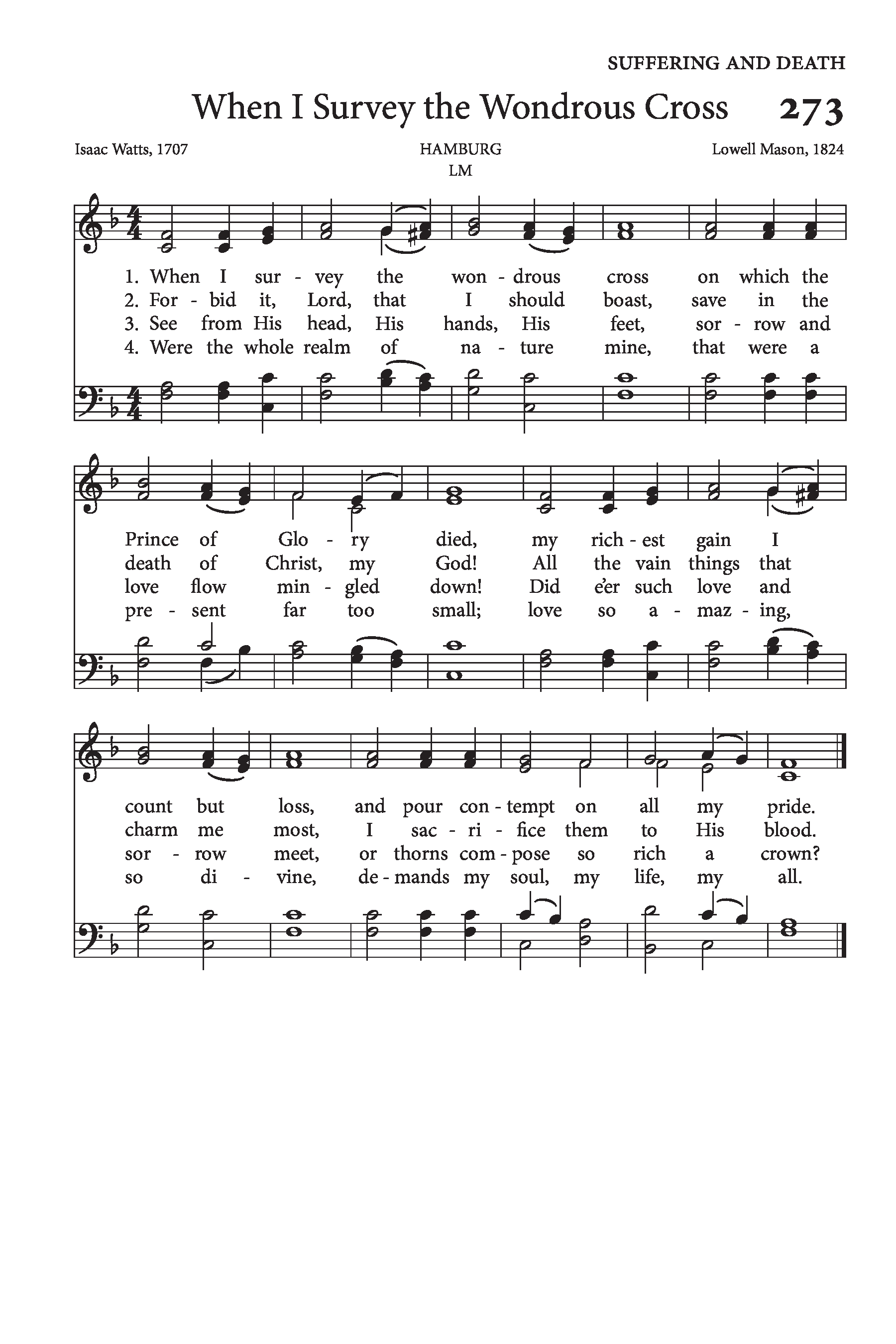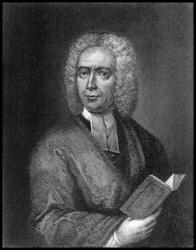When I Survey the Wondrous Cross
By Isaac Watts
Lyrics
on which the Prince of glory died,
my richest gain I count but loss,
and pour contempt on all my pride.
save in the death of Christ, my God!
All the vain things that charm me most,
I sacrifice them through his blood.
sorrow and love flow mingled down.
Did e'er such love and sorrow meet,
or thorns compose so rich a crown?
that were a present far too small.
Love so amazing, so divine,
demands my soul, my life, my all.
Bible Reference
Romans 12:1-2
About This Hymn
Author – Isaac Watts, 1674–1748
Music – From a Gregorian Chant
Arranged by – Lowell Mason, 1792–1872
Tune Name – “Hamburg”
Meter – LM (88.88)
Scripture Reference – Galatians 6:14
Verse – “And He bearing His cross went forth into a place called the place of a skull, which is called in the Hebrew, Golgotha.” John 19:17
The beloved hymn “When I Survey the Wondrous Cross” was written in 1707 by Isaac Watts for use in a communion service. It was first published that same year in Hymns and Spiritual Songs, a groundbreaking collection authored by Watts. Originally titled “Crucifixion to the World by the Cross of Christ,” this hymn has been described by the theologian Matthew Arnold as the greatest hymn in the English language.
Isaac Watts was born in Southampton, England, on July 17, 1674, the eldest of nine children. His father, a deacon in a dissenting Congregational church, was imprisoned at the time of Isaac's birth for his nonconformist faith. Despite a turbulent religious environment, young Watts displayed remarkable academic ability. He learned Latin by age five, Greek at nine, French at eleven, and Hebrew by thirteen. Early in life, he also began composing poetry of notable quality.
Known today as the father of English hymnody, Watts sought to reform what he considered the uninspiring state of congregational singing in his time. English churches typically sang metrical psalms in slow and mechanical fashion, often preceded by a deacon reading each line aloud. These texts were frequently crude and lacking in elegance. A well-known example from that era humorously reads:
“Ye monsters of the bubbling deep, your Master’s praises spout;
Up from the sands ye coddlings peep, and wag your tails about.”
Frustrated by such undignified texts, Watts once declared, “The singing of God’s praise is the part of worship most closely related to heaven; but its performance among us is the worst on earth.” After one particularly poor service, Watts’s father challenged him to do better. That same day, Isaac composed his first hymn, which was met with great enthusiasm. He then committed to writing a new hymn every week for two years.
His most lasting contribution was a complete revision of the Psalms in hymn form, striving to infuse them with the message and tone of the New Testament. From this work came enduring hymns like “Jesus Shall Reign” and “O God, Our Help in Ages Past.” Watts also authored well-loved children's hymns such as “I Sing the Mighty Power of God.” Because of his innovative approach, Watts was considered radical in his time, yet his work set the standard for modern English hymnody.
Watts did not restrict himself to Psalm-based hymns. He also pioneered the use of hymns based on personal Christian experience, which he termed “hymns of human composure.” “When I Survey the Wondrous Cross” belongs to this category. These hymns, focused on the believer’s inward life and relationship with Christ, were controversial in his day but deeply influential. In all, Watts wrote more than 600 hymns, many of which are still sung today.
The melody most commonly associated with this hymn, known as “Hamburg,” was arranged by Lowell Mason in 1824. Mason was a leading figure in American church and public school music. He adapted the melody from an ancient Gregorian chant, a form of early church music passed down from Jewish temple worship and further organized during the time of Pope Gregory in the sixth century. Gregorian chants remain foundational to Roman Catholic music today.
The “Hamburg” tune was first published in The Handel and Haydn Society Collection of Church Music in 1825. Its simple five-note range contributes to its solemn and reverent tone, making it well-suited for a hymn of reflection and worship. Despite its simplicity, the melody's depth has allowed it to endure for generations.
Lowell Mason is also remembered for other hymns such as “From Greenland’s Icy Mountains,” “Nearer My God, to Thee,” “A Charge to Keep I Have,” “My Faith Looks Up to Thee,” and “O Day of Rest and Gladness.” His arrangement of “Joy to the World” is another enduring favorite, setting Isaac Watts’s text to music inspired by themes from Handel.
Together, Isaac Watts and Lowell Mason have given the Christian church one of its most treasured hymns—a timeless meditation on the meaning of the cross and the believer’s response of devotion and surrender.


📬 Subscribe to Our Devotional Updates
Receive weekly hymns, devotionals, and website features directly in your inbox.
Hymn Information

- Category: Hymn
- Author/Writer: Isaac Watts (1707)
- Added: July 1, 2025
- Last Updated: January 12, 2026
- Views: 1808
MIDI File
Popular Hymns
Recent Blog Posts
Popular Blog Posts
Visit Us on Social Media
Latest from X (Twitter)
Tweets by HymnalLibraryLatest from Facebook
Latest on YouTube
Daily Bible Verse
Disclaimer
The hymns, sheet music, MIDI files, and related content on this website are provided for educational and research purposes only.
- Public Domain: Many of the hymns featured here are in the public domain and may be freely used.
- Copyrighted Works: Some hymns may still be under copyright protection. Where applicable, permission has either been requested from the copyright owner, or the content is shared under the principles of fair use for educational purposes.
⚠️ Important Notice: If you wish to reproduce, distribute, or use any copyrighted hymn beyond personal study or educational use, you must obtain permission directly from the copyright holder. This website does not grant any rights for commercial use yet.
If there is any other question please address it to us in our Contact Page, for further assistance. Thank you for using the site. May God Bless You.












